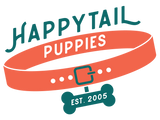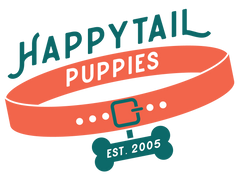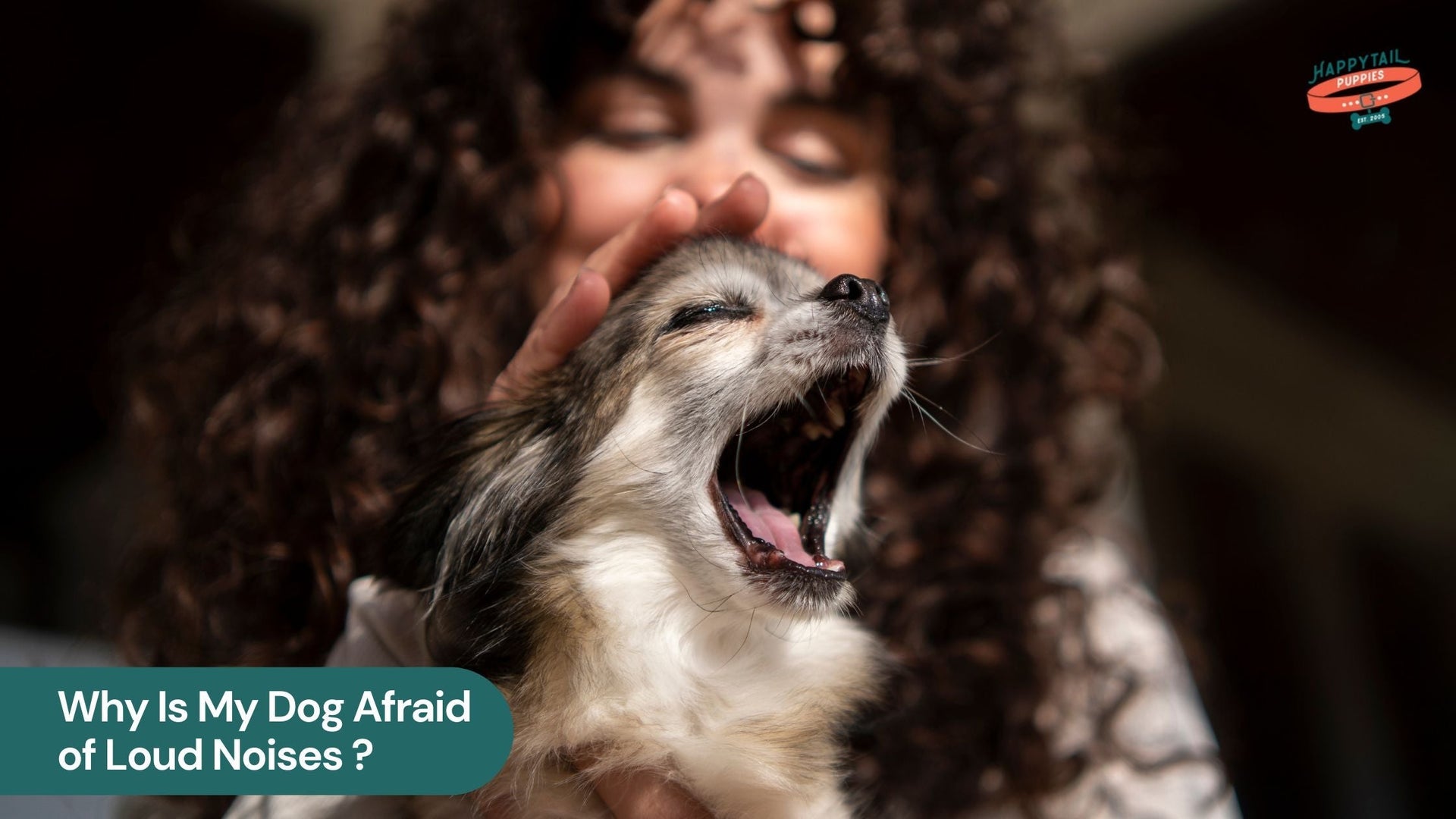Why Is My Dog Afraid of Loud Noises
Does your dog hide during thunderstorms or fireworks? Noise phobia is common, and understanding why dogs are afraid of loud noises—from heightened senses to past trauma—is key. Learn to spot signs like panting, trembling, or barking, and find practical ways to help your anxious pup cope.
While humans enjoy the spectacle of thunder rolling through the sky or fireworks bursting during a holiday celebration, your furry companion will bolt under the bed. This is a common situation that pet parents are familiar with. Several dog owners will find themselves helpless in these instances. Such fearful reactions are highly inconvenient, as these are probably signs of noise phobia that need extremely thoughtful care. Having complete knowledge about this fear is the initial approach towards helping your dog feel safe and secure. In our blog today, we will look at the various reasons behind this phobia and try to answer the most common questions brought forward to us by pet owners: Why are dogs afraid of loud noises?
Common Signs Your Dog Is Afraid of Loud Noises
Few dogs often run and take cover, or hide. Others may start barking excessively. Small dog breeds like Chihuahuas are mainly known for overreacting to sudden sounds due to their alert nature and compact size. The signs of noise-related anxieties are often unmistakable once you know what to look for.
- Panting or Drooling: Whenever your dog hears a loud noise, it will start panting heavily or drooling excessively, even if the surroundings are cool or it has not exercised. This is a clear sign of elevated levels of stress and internal panic.
- Trembling or Shaking: If you have been wondering why my puppy is scared of loud noises, visible trembling or shaking during fireworks or storms is one common indicator. Pups often lack coping mechanisms and strongly react to overwhelming new sounds.
- Barking or Howling: Repetitive, loud barking or howling often starts after a noise like a siren or a thunderclap. It is often an effort to showcase fear or discomfort, or an attempt to remove danger. In a couple of instances, elevated stress levels often spiral into redirected behavior like dog aggression towards cats, mainly in households with other pets and tensions already ruling.
- Attempting to Escape: In serious cases, dogs often try running away or clawing at doors and windows. This behavior is a panic response that can lead to injuries when dogs are not kept safe.
- Clinginess or Excessive Attention-Seeking: A dog that suddenly follows you around, leans on you, or jumps up constantly during loud events is more often trying to find reassurance or comfort under your supervision or presence.
- Involuntary Urination or Defecation: For a few dogs, extreme fear overstimulates their body's control. You may often find them peeing or pooping suddenly indoors, mainly during any nearby construction noise or fireworks.
Reasons Behind a Dog’s Fear of Loud Noises
Dogs often react to sound in ways that we often fail to understand. Small dog breeds like Shih Tzu, irrespective of their calm demeanor, show surprising sensitivity to loud noises. We will now explain how genetics, physiology, and experiences play critical roles in their reactions.
Heightened Senses: Dogs Hear What We Can’t
Dogs are known to have auditory ranges that far exceed those of humans. They seamlessly detect sounds from a greater distance and high frequencies. Their higher sound sensitivity makes them react even to moderate noises. Sirens, vacuum cleaners, and fireworks create a huge sensory overload.
Acute hearing in dogs is mainly a biological trait that developed over centuries of evolution. These traits are beneficial in the wild; however, they become challenging in noise-saturated modern spaces. Dogs do not just hear the bang of fireworks; they can hear every vibration and echo associated with it. Knowing this can help pet parents implement early training methods like socializing their dog to help reduce reactivity to everyday sounds of the surroundings through gradual and safe exposure.
Early Life Experiences and Puppy Conditioning
Puppies raised in rural or calm areas may often find sudden urban noises startling. Exposure during the early socialization window, mainly when they are around 3-14 weeks old, notably impacts the manner in which they react to their surroundings later. When loud noises are absent or are associated with trauma, it paves the path for building negative associations.
If you find your pup scared of loud noises, chances are that their early environment missed consistent, non-threatening exposures to sounds and other noises. A sudden change like moving to a city may amplify their fear responses. Small dog breeds like Yorkshire Terriers are well-known for their high-strung and alert personalities, as they are prone to developing anxiety when sound exposure during puppyhood is frightening or inconsistent.
Lack of Predictability Triggers Anxiety
Dogs crave a consistent routine and structure. Loud noises unexpectedly strip their environment of predictability. Thunderstorms never follow your pup's walk-and-treat schedule. Fireworks start hitting without any warning. This lack of control causes your dog's anxiety to skyrocket.
A 2020 study conducted by the American Kennel Club Canine Health Foundation highlighted that unpredictability has been one of the most consistent triggers in dogs sensitive to noise. The same study emphasized that fear responses worsen over time when left unaddressed.
Past Trauma and Negative Associations
Numerous rescue dogs show signs of noise phobia, which is often linked to their previous trauma. A dog that was frequently yelled at previously, abused, or left in loud shelters may develop deep emotional scars. Such kinds of associations start growing over time, leading to exaggerated responses which are identical to the sounds later on.
For instance, a dog that was trapped in a kennel during a thunderstorm will forever start associating thunder with their helplessness. Over time, even a slight rain may become a huge trigger that demonstrates how trauma rewires the emotional responses. Physical symptoms like excessive dog drooling start developing during such episodes, indicating the growing panic in dogs to self-soothe whenever they get exposed to the identical auditory cues.
Genetic Disposition and Breed Sensitivity
A few small dog breeds are often prone to anxiety related to noise due to their reactive temperaments and naturally alertness. This elevated sensitivity, although useful for watchdog behavior, leads to exaggerated startle responses whenever exposed to sudden sounds. Several small dog breeds develop strong bonds with their owners and choose to stay indoors most of the time, indicating that their exposure to environmental noises remains inconsistent, amplifying their fear or surprise whenever loud noises happen unexpectedly.
A study published in ResearchGate found that around 23% of dogs exhibit a fear of loud noises, with notable differences in sensitivity between different breeds. Such results highlight the possibility of a genetic element connected to sound-induced fear.
Neurological Processing and Overreaction to Stimuli
Dogs with noise aversion experience a form of auditory hypersensitivity. Their brains process the sounds differently, often categorizing them as vulnerabilities. The amygdala, or the fear processing center, enters into overdrive.
The vets often compare this to the way some humans react to PTSD triggers. Dogs may fail at rationalizing the source of the sound but react as if they are under attack. Such reflexive overreaction is not something they would snap out of, as it is a neurochemical response. Such intense fear-based reactions become a part of the common behavioral issues in small dogs that display their amplified anxiety responses due to their heightened alertness and closing bond with human routines.
Lack of Desensitization and Behavioral Reinforcement
If we give treats or pay a lot of attention to dogs feeling scared by sounds, we could accidentally make the dog think noise is more worth being afraid of. It’s important not to dismiss your dog’s fear but to set up your praise techniques with care.
You should use recordings of thunder played at low volume, then reward your pet with a calm attitude. Studies have indicated that structured counterconditioning improves a dog’s response to noise with gradual exposure.
Fireworks, Thunderstorms, and the Environment
Different loud noises can bring on fear. When you see fireworks, you notice the flashing, the powder odor, and the loud noises. Before thunder can be heard, a barometric pressure change can cause dogs to respond because they can feel it.
Because of these environmental changes, a dog’s behavior typically changes hours before a storm. The research finds that what scares them is the overall sensory experience in and around these events, not just the sound.
The Role of Human Reaction and Home Dynamics
Dogs sense how their owners are feeling and respond to them. If you are nervous during a thunderstorm, your dog will sense your mood. Instead of yelling commands, using structured games that keep your dog focused during loud events can make them feel calm.
It is also important to consider the home environment. According to each pet, regular yelling or vacuuming near a dog can mean the animal gets used to loud noises or becomes too sensitive.
Medical Conditions and Pain Sensitivity
Health problems can make dogs more easily upset by sound. Arthritic, dental, or ear-infected dogs are likely to react more than healthy dogs because they are already bothered by pain. Oftentimes, sounds come to cause discomfort even when there is no connection.
Sometimes, dogs who cannot hear well behave in ways that are harder to predict. When they hear a sudden loud noise outside their current hearing, it can make them more frightened or distressed.
Coping Tools and Environmental Adjustments
Helping your dog means training, patience, and sometimes consulting a professional. Part of helping a pet recover is using noise-canceling wraps, calming chews, and quiet spaces. Crate forests or using white noise to play during these events can comfort your pets.
If you’d like, you can find a certified canine behaviorist to guide you through behavior modification. Calm guidance, giving rewards, and gradually letting your pet get used to new things are some modern ways to lessen anxiety.
Final Thoughts
Sharing your household with a noise-sensitive dog is the most challenging experience; however, it is way past any hopelessness. Your dog's fear is not a reflection of weakness; it is an instinctive response shaped through experience, biology, and environment. Structured support, training, and consistency help rebuild the sense of safety. If you asked yourself why your pups are afraid of loud noises, then the answer does not rely on a single cause; however, in a complex web of dog psychology and the lived experience.


